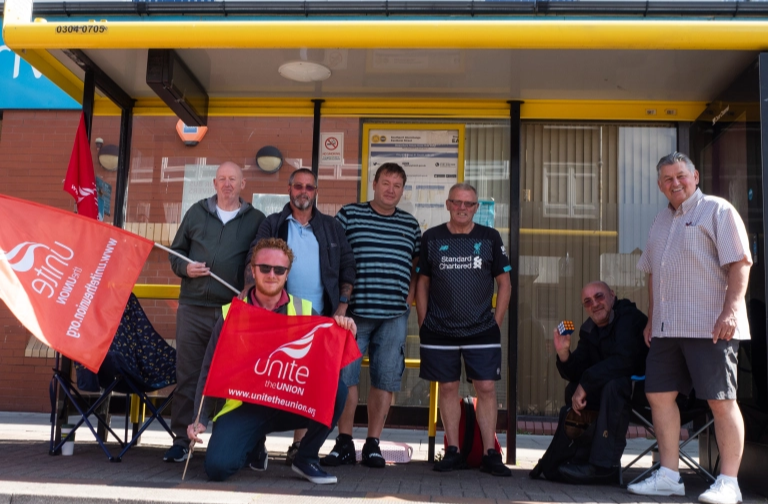
Striking bus drivers outside the Arriva North West office on Eastbank Street, Southport [Lorraine Mallinder/Al Jazeera]
London, August 15 (RHC)-- In Southport, an old seaside town in the northwest of England, bus drivers congregated under a bus stop. They stood and chatted, one fiddled with a Rubik’s cube, and a couple held red flags, now three weeks into an acrimonious standoff with bus operator Arriva North West.
“Do you realise I’m on minimum wage too?” yelled the helmeted driver. “I’m the one paying for all this.” After a heated exchange lasting about a minute, he sped off. It was just another day on the picket line – sandwiched between the offices of Arriva, located right behind the bus stop, and the public.
And it is just another dispute, part of a wave of strikes threatening to paralyse the UK’s transport and telecoms networks, ports, hospitals and schools – each one distinctive, yet united by the nation’s current mood of discontent.
Initially, the protesters were wary, worried about visits from company moles but the tension gradually eased and soon everyone was talking. The complaints are about paltry pay rises, deteriorating conditions, fat-cat executives and colossal corporate profits.
Arriva, a UK operator which runs more than 4,700 buses nationally, has large stakes in bus and rail services across Europe. It receives local and national government subsidies and is owned by Deutsche Bahn, one of the world’s largest transport companies, which has forecast an operating profit of more than one billion euros ($1.02 billion) for 2022 - a solid post-pandemic recovery as energy prices skyrocket.
As for the bus drivers, after years of minimal pay rises which failed to keep pace with inflation, now galloping towards 13 percent in early 2023, many have been forced to resort to state benefits to stay afloat.
During the coronavirus pandemic, the company showed gratitude by giving bus drivers a box of chocolates. About the time they received the chocolates from Arriva’s front desk, their names ticked off a list to ensure nobody received more than one box, Arriva announced that it was scrapping two of its pension schemes, citing a deficit of 18 million pounds ($22m).
In this period of uncertainty, having risked their health to play a front-line role ferrying medical staff to hospitals when COVID-19 was raging, drivers with decades of service felt the rug had been pulled from under their feet.
According to workers, there was scant consultation or advice. Solutions that were eventually presented left workers feeling they had been short-changed. Against this backdrop, the ill-judged gift of chocolates, which were a brand named Heroes, stung.
“It was cheap and patronising,” said John Larkin, 26. “Now workers are seeking to raise their pay, they are no longer ‘heroes’. We are viewed as feckless, work-shy, militant trade unionists.”
Drivers are demanding a 11.1-percent pay rise, which would bring their hourly rate to 15 pounds ($18). In the last round of negotiations before the strike, Arriva had offered a 3 percent rise or 6 percent accompanied by cuts to sick pay and weekend overtime rates. Workers turned down the offer, saying that the company was giving with one hand and taking away with the other.

